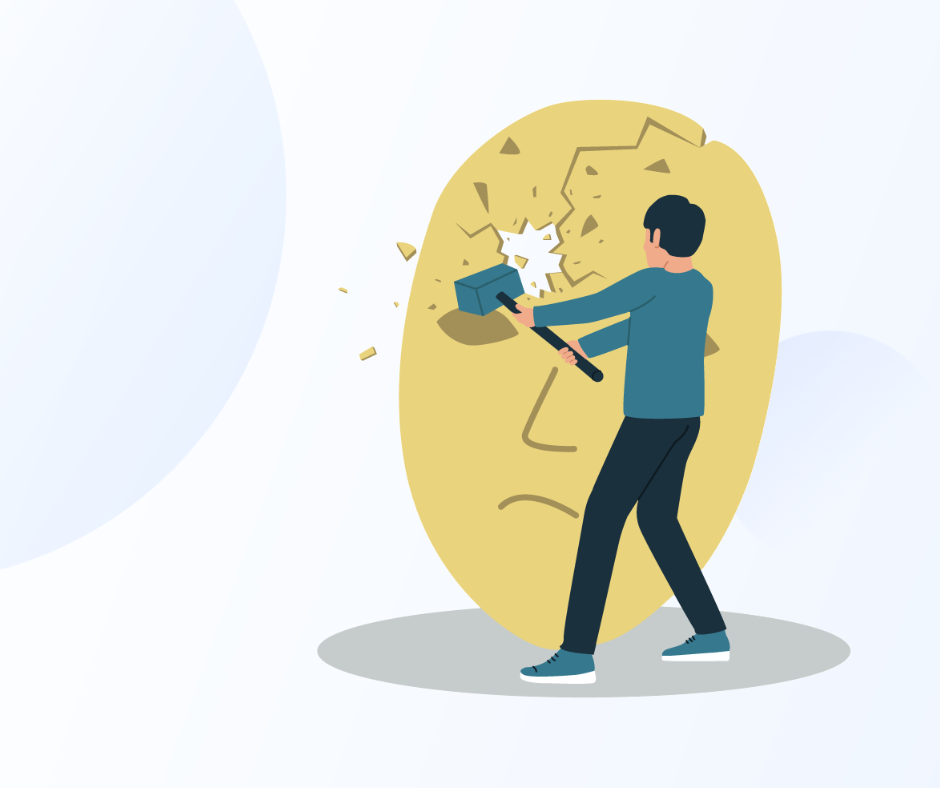Have you ever felt the lingering suspicion that despite your certifications, work accolades, praise, and promotions, you’ve managed to pull the wool over everyone’s eyes and pretend to be a qualified professional? Or perhaps you’re convinced your colleagues have it all together except you?
Imposter syndrome is a mindset causing you to doubt your competence. It looks like chronic worrying and fear that, despite all the evidence to the contrary, you have only succeeded through pure luck or piggybacking off the success of others. Imposter syndrome thoughts can prevent you from acknowledging your success, mire you into maladaptive behaviors, and leave you feeling like a phony.
However, you’re not alone if you experience these types of thoughts-it’s incredibly common! By adjusting your inner voice and learning to identify the flawed thought pattern, you can take pride in owning your accomplishments, advocate for yourself with less stress, and move forward with confidence.
What is imposter syndrome?
American psychologists Pauline Clance and Suzanne Imes coined the term imposter syndrome in 1978 while studying high-achieving women. Pervasive doubt about their own abilities plagued these women despite earning praise and recognition for their outstanding successes.
The psychologists soon realized this inability to internalize success or attribute it to their efforts wasn’t exclusive to women. This pattern of disruptive negative thinking stretched across all demographics, causing crippling self-doubt, negative self-talk, and a lack of self-confidence. Nearly 70% of adults experience imposter syndrome at some point in their lives! It can happen in your career, friendships, romantic relationships, or parenting roles. The main hallmark? Contradiction. Regardless of how others view your skills and despite evidence of your competence, you can’t shake the belief that you’re not good enough, don’t belong, or didn’t earn your seat at the table.
“Imposter Syndrome” is a misnomer; it’s not a diagnosis or medical problem.
Examples of imposter syndrome
- You start a new business and feel uncomfortable telling others or promoting it because there are other, more established people in your field.
- You accepted a job promotion but feel uncomfortable when people refer to your new title because you haven’t mastered the position.
- You’ve been nominated for an award but feel like a fraud standing next to the other nominees because you don’t think your accomplishments warrant recognition.
“There’s a big difference between secretly doubting your abilities and being made to feel as if your identity makes you unworthy of your position or accomplishments.”
While imposter syndrome is a pattern of disruptive thinking in an individual, workplace cultures can perpetuate the problem through issues rooted in systems of discrimination. Imposter syndrome disproportionately affects women and underrepresented identities. The onus is not just on the individual to “fix themselves.” Organizations must recognize the role they can play by fostering environments where imposter syndrome festers. Read End Imposter Syndrome in Your Workplace.
Imposter Syndrome’s Casualties
Imposter syndrome doesn’t just impede you with a bombardment of thoughts that you’re not good enough or don’t belong. These beliefs impact your behaviors and actions while influencing your physical and mental well-being. Consider the collateral damage:
- Your mental well-being: an inability to see your inherent worth goes hand in hand with mental health problems, including low self-esteem, chronic stress, and emotional exhaustion. Anxiety and depression generally accompany imposter syndrome.
- Your physical well-being: operating from a place of fear or pressure means your body produces the stress hormone cortisol. Chronic stress leads to a host of health issues like insomnia, weight gain or loss, lowered immune functioning, and heart problems.
- Your motivation: as you overwork to prove yourself and attempt to attain impossibly high standards, you’re at high risk of burnout. You meet accomplishments with temporary relief rather than pride. This short-lived respite quickly changes to doubling down on your efforts to ‘prove yourself’ again.
- Your growth: You avoid risks for fear of failure, prematurely removing yourself from potential growth situations. Feelings of being unqualified mean you aren’t quick to vouch for yourself and hold yourself back from advancement. This can look like avoiding negotiating for a higher salary, side-stepping a promotion, or staying in a job longer than you had planned.
- Your job satisfaction and performance: You’ve conditioned yourself towards maladaptive behaviors like; procrastination out of fear you won’t meet the highest standards, over-preparation, or spending too much time on a task than necessary, avoiding asking for help, problems with decision-making, and not voicing opinions.
- Your relationships: Feelings of insecurity cause you to believe you’re unworthy of attention and praise. You build walls out of fear of being “found out” as an imposter and avoid becoming closer with colleagues lest your faults are exposed and you are subsequently rejected.
Signs and symptoms of imposter syndrome
- You credit luck for your success, believing you haven’t earned what you’ve achieved.
- You devalue your worth and are unable to accept praise because you don’t believe it’s true or that you deserve it. You feel unworthy of attention.
- You undermine your experience by downplaying your accomplishments and fail to assess your competencies accurately.
- You can’t let the minor things go, beating yourself up for every error. You overemphasize your mistakes and write off your successes.
- You suspect you’re the only one who has to try as hard as you do and think everyone else has it all together. You’re afraid you’ll be unmasked as a fraud.
- You always put on the pressure to perform perfectly. To you, a mistake is an admission of inadequacy. Overworking is the only way you believe you can meet expectations.
- You’re afraid of success and failure. You fear your inability to replicate success and dread failure as it exposes your incompetence.
5 Types of Imposter Syndrome
Imposter syndrome expert Dr. Valerie Young categorizes 5 types of cognitive distortions or errors in thinking.
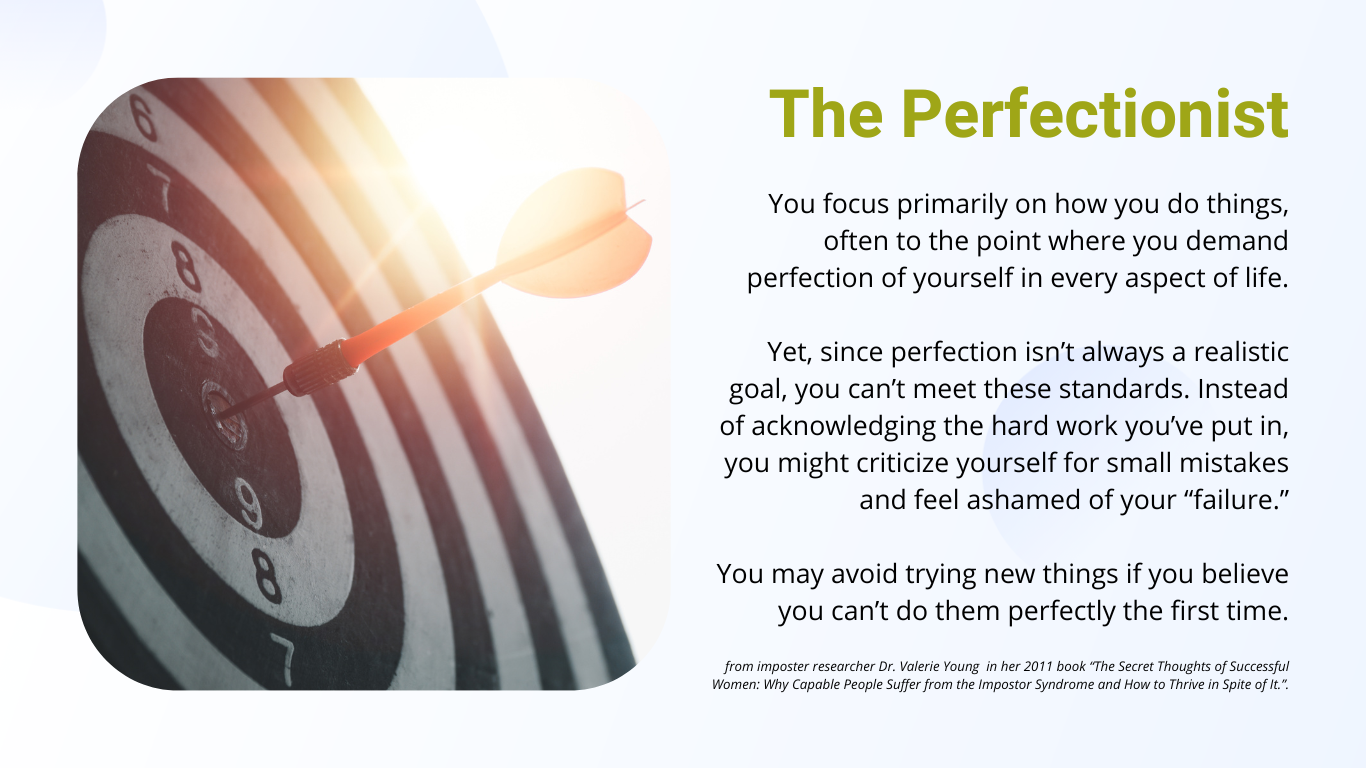
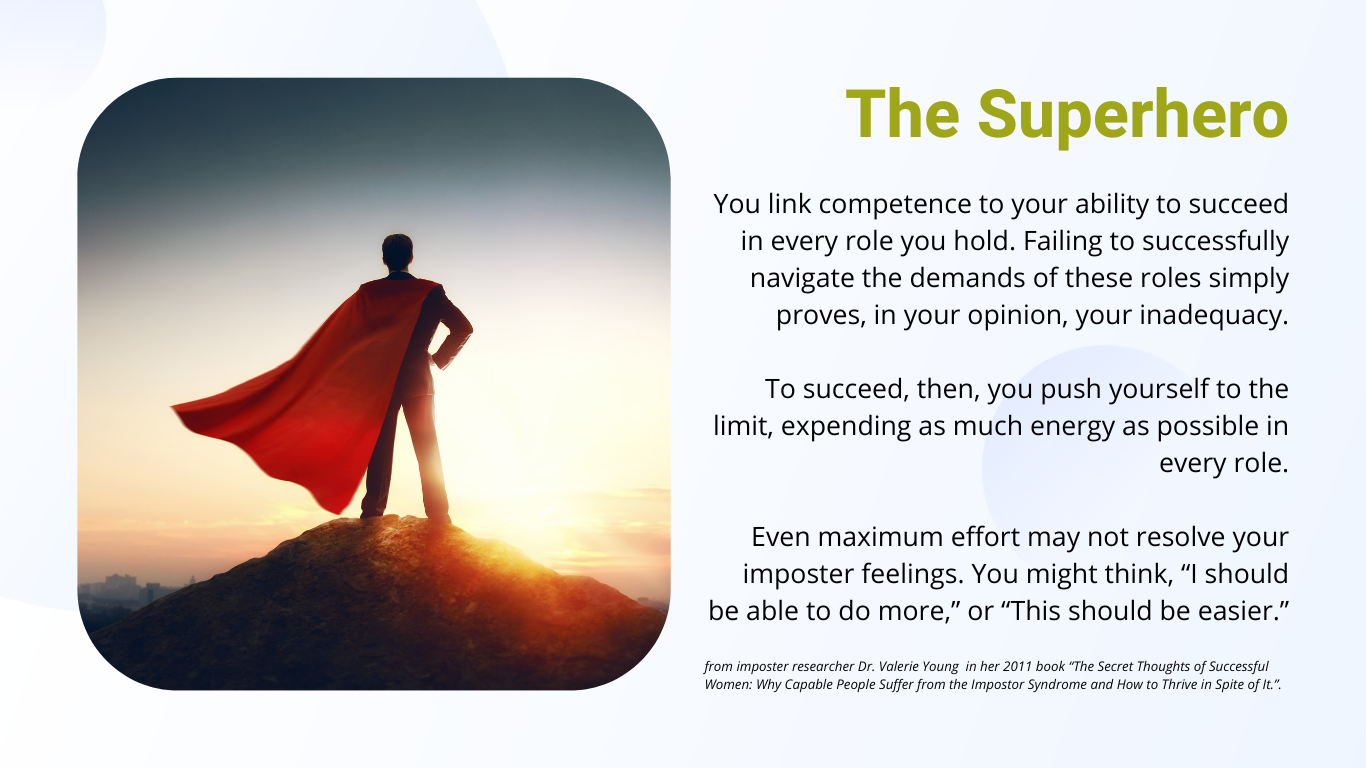
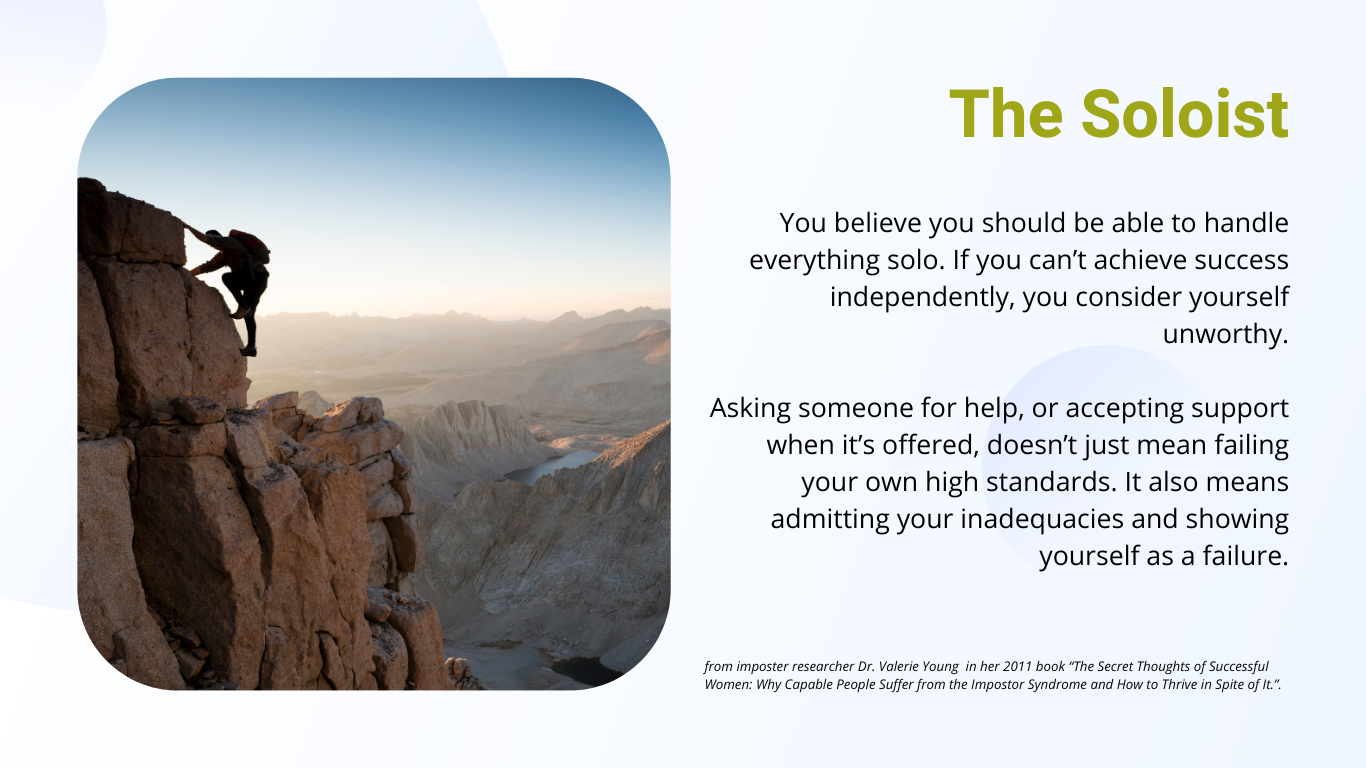
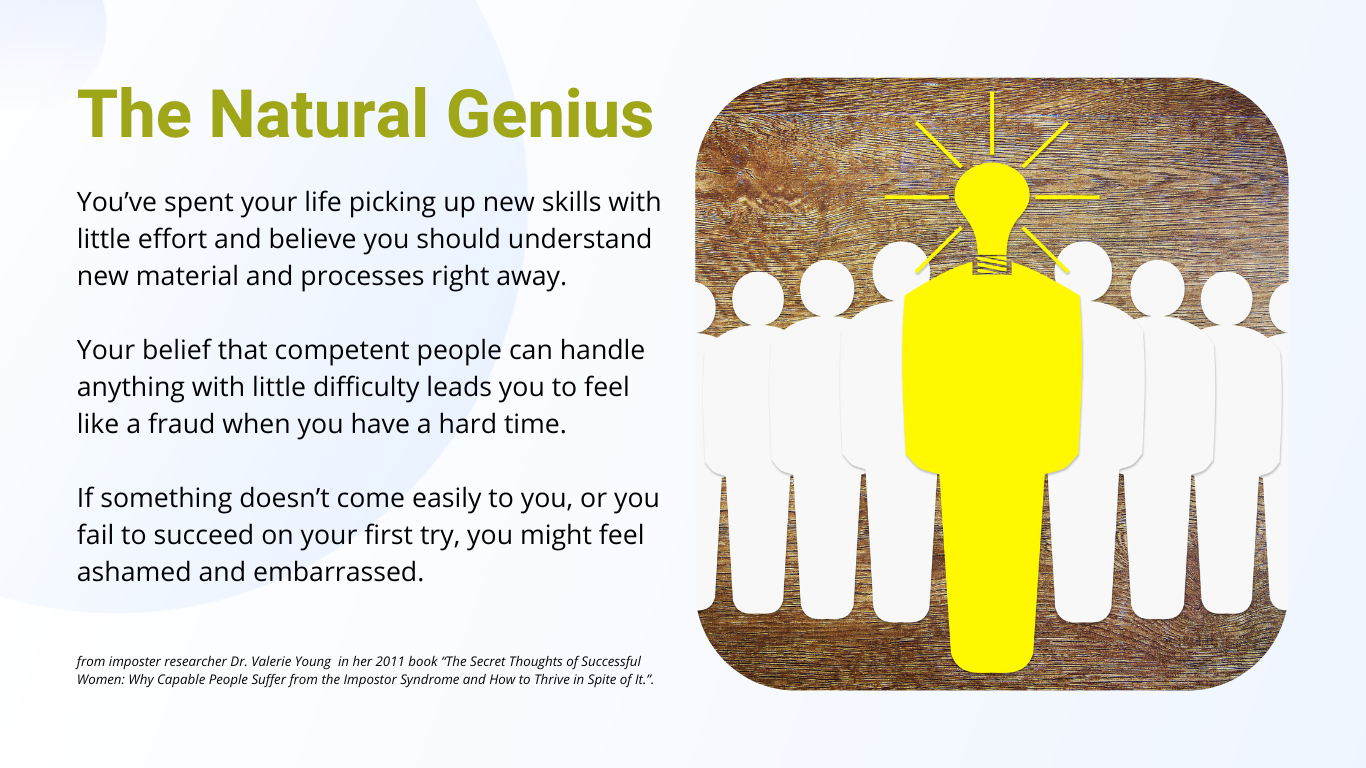

Overcoming Imposter Syndrome
Counteract self-sabotage, interrupt negative thought patterns, and take ownership of your success with these steps.
Take note of your accomplishments:
Keep a kudos file of evidence of your success. You can include a list of accomplishments, compliments, praise-laden emails, congratulations, encouraging feedback, notes of meaningful contributions, and anything you constitute a win. It doesn’t have to feel significant. All the items you include, big or small, show you as a competent high-performing professional when taken together.
Practice positive self-affirmations:
Talking to yourself kindly and gently can feel corny at first. However, what you say to yourself profoundly impacts your self-perception. Thoughts influence your feelings and behaviors, so choose which ones to cultivate by focusing on them. When you notice imposter thoughts creeping in like, “I can’t do this,” switch your mindset by introducing positive affirmations like, “I can’t do this yet, but I know I can develop the skills to do it.” You can say it in your head, out loud, or write it down. The point is to pivot from self-deprecation to self-empowerment.
Cultivate self-compassion:
Liberate yourself from self-imposed pressures by reminding yourself your accomplishments and mistakes aren’t tied to your worth. Take a less critical approach and nurture growth out of love for yourself.
Observe your thoughts:
Understand that your thoughts are perceptions- not the objective truth. Watch your imposter thoughts unfold without getting wrapped up in them. An observational frame of mind enables you to detect, interrupt, and replace negative thoughts and limiting beliefs.
Reframe failure:
Everyone makes mistakes, but with an imposter mindset, you become convinced any error is a shiny neon sign broadcasting your incompetence. Reframe how you view failure. Understand failure is never final and see it as a learning opportunity that can propel you to growth.
Visualize Success:
A self-defeating attitude puts you in an anxious mindset that doesn’t allow for your best work. Instead, calmly examine how you’ll navigate a situation before it happens. Focusing on the next step forward helps you stay in the right mindset and see the path to success.
Celebrate success:
Resist the urge to minimize or brush off your success. Take a moment to soak in your accomplishments and relish the feeling of a job well done. Taking time to applaud yourself and own the part you played helps you internalize success.
Set realistic expectations:
Setting pie-in-the-sky goals backfires by setting you up for disappointment. You’ll expend enormous effort and time to achieve it. But when you inevitably fail to meet these expectations, it causes self-judgment, shame, and frustration. Instead, identify how to break down a goal into smaller, digestible steps, focus on your progress, and reward yourself for taking action.
Drop the cape:
Sometimes good enough is good enough. Break free from the role of ‘expert’ by asking questions and seeking guidance when needed. Your best becomes better when you allow yourself to practice, make mistakes, and learn from others rather than draining your time and energy trying to be perfect on your first attempt.
Stop comparing:
Comparison increases your insecurity by focusing your thoughts on qualities you believe you lack. Remember, you have behind-the-scenes access to all the mistakes leading up to your success. But you don’t have a backstage pass to others’ lives, and comparing your real life to someone’s highlight reel only fuels self-doubt.
Accept it:
As you tame imposter thoughts, understand that they may not disappear forever. Life changes, new roles, or experiences can herald imposter syndrome. Trust that you have the tools to conquer it again.
Talk to a professional:
A counselor can help you recognize your thought patterns and help tailor an action plan for tackling your negative thoughts. Your counselor can help by validating your experiences, encouraging new habits, guiding you through insecurities, and providing feedback.

